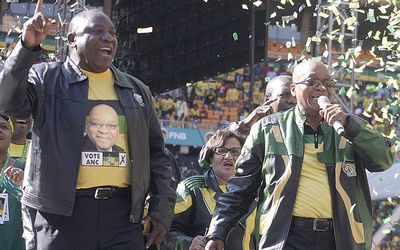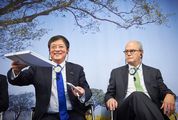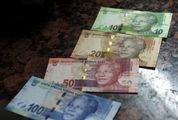WHEN boos for President Jacob Zuma threatened to spoil the memorial service for Nelson Mandela, Cyril Ramaphosa, the master of ceremonies, stepped to the podium. Switching between English and Zulu in front of President Barack Obama and other world leaders, Mr Ramaphosa challenged the hecklers in the crowd of about 50,000.
"Are we going to be disciplined?" he shouted four times. "Will there be order?" The jeers faded.
In taming the crowd on that rainy December afternoon in Soweto, Mr Ramaphosa showed his credentials as a possible unifier in an increasingly divided South Africa. Deputy president of the African National Congress (ANC) and worth at least $248m, he is a frontrunner to succeed Mr Zuma eventually. The president is expected to put Mr Ramaphosa in charge of implementing the government’s economic programme. Mr Ramaphosa "understands labour and business", says Nedbank chief economist Dennis Dykes. "One would look to him to provide much more economic leadership, which has definitely been lacking in this government."
Reaching the Presidency would cap a career that includes establishing South Africa’s largest union, negotiating the end of apartheid, leading the writing of the constitution and building an investment company from scratch that is worth R8.8bn.
Between the company and his own investment, he controls the McDonald’s franchise in South Africa.
Mr Ramaphosa has been close to South Africa’s political summit before, losing out to Thabo Mbeki as Mandela’s successor in 1999. He left front-line politics for business but kept a spot on the ANC’s national executive committee. In recent months, the ANC tapped him to negotiate an end to feuding among union allies that are crucial to delivering the vote. Mr Zuma also sent him to South Sudan to help mediate an end to the civil war.
"He’s an action man, he gets things done," National Union of Mineworkers general secretary Frans Baleni says.
To his critics, Mr Ramaphosa is a symbol of what is wrong with the ANC-led government, in which some leaders have grown personally wealthy while violent street protests over service delivery occur almost daily. South Africa remains among the world’s most unequal nations.
Asked in a 15-minute interview during a campaign stop in the New Crossroads township in Cape Town last month about being so wealthy amid rampant poverty, Mr Ramaphosa said: "It’s not tricky. We want everyone to have the same opportunity because this is what our democracy should mean to people."
After the election, he will take over management of an economy that suffers from power cuts, 25% unemployment and protracted strikes.
He will implement the 20-year National Development Plan (NDP) that he helped draft, according to two people familiar with the plans of the ruling party, who asked not to be identified because the decision has not been made public. The NDP aims to create 11-million jobs by 2030 by loosening restrictions on business, and expanding railways and ports to boost exports.
Mr Ramaphosa has served on numerous company boards, advisory panels convened by Coca-Cola and Unilever, and as a mediator in Northern Ireland.
"He really understands politics in the ANC and South Africa, but now after 14 years of being outside he understands big business and small business," says Kojo Mills, a Harvard Business School graduate who helped Mr Ramaphosa start Shanduka in 2000 and remains a shareholder and board member. Mr Ramaphosa’s family trust owns 29.6% of Shanduka.
There was a public uproar in 2012 when Mr Ramaphosa made a failed R19.5m bid for a buffalo cow and calf at a game auction. A lover of jazz and fly fishing, he keeps a cattle ranch in Mpumalanga and has submitted plans for a house on a hillside overlooking the sea in Cape Town’s exclusive Fresnaye suburb. City deeds records show his trust bought the land for R30m.
Shanduka CEO Phuti Mahanyele says Mr Ramaphosa has not used his political connections to help his business. "He’s never said, ‘Let me call this minister because I know her or him and I need this done.’"
Mr Ramaphosa did come in for criticism from some unions in the wake of the police shooting of 34 protesters at Lonmin’s Marikana platinum mine. Evidence presented before the commission of inquiry into the killings showed he had e-mailed executives at Lonmin, in which Shanduka had a stake and at which he was a nonexecutive director at the time.
Saying he would try to persuade government ministers to address the turmoil, he described the strike-related violence as "plainly dastardly criminal" and said "concomitant action" was needed.
In a letter to the commission in May last year, he said he had sought to prevent further loss of life and the shootings were not the result of his talks with government officials.
His assurances did not impress Irvin Jim, the general secretary of the 341,000-member National Union of Metalworkers of South Africa, a Cosatu affiliate. He sees the events at Marikana as evidence of Mr Ramaphosa’s switch in loyalty from workers to big business: "From where I’m sitting I think we have got somebody who is seriously conflicted. I would not vote for Cyril as president."
At Shanduka Mr Ramaphosa drove his executives to seek deals and left them to arrange the finer details as he set the strategic direction, Mr Mills says.
He cared more about the chase than about the details, says Ndoda Madalane, a corporate finance specialist Mr Ramaphosa recruited from Old Mutual to become Shanduka’s first CEO. While the business ran smoothly for the first two or three years, tension arose after Mr Ramaphosa became operationally involved — something he was ill-equipped to do, says Mr Madalane, who quit as CEO in 2006. "He tended to revel in deal momentum," Mr Madalane says. "The rigor of the investment process that we tended to apply was not really a key consideration for him. You mess up going into a deal, that’s a mistake you can’t fix."
Shanduka paid 18% in annual interest on the loan it needed to buy a 30% stake in Alexander Forbes, but it fell short of projected performance from the first year. The arrangement was "a disaster", Mr Madalane says.
He says Mr Ramaphosa’s "mettle and gravitas" make him the right choice as president. He recalls how when MTN was having trouble repatriating money from Nigeria in about 2004, Mr Ramaphosa, then the company’s nonexecutive chairman, met then-president Olusegun Obasanjo and the issue was quickly resolved.
He may face competition to become South Africa’s next leader from ANC treasurer Zweli Mkhize and from Nkosazana Dlamini-Zuma.
In New Crossroads, Mr Ramaphosa spent 20 minutes in the one-room shack of Nozipho Bebheza, a woman who lost the use of her legs in a car accident. "It should pain every leader of our revolution to see how our people all over the country live," he said. "Everyone can do more, and business especially. They haven’t grasped the nettle yet, that’s what I’ll be driving."
Bloomberg

FRONTRUNNER: ANC deputy president Cyril Ramaphosa, left, sings at the party’s Siyanqoba rally in May, alongside President Jacob Zuma. Picture: PUXLEY MAKGATHO
WHEN boos for President Jacob Zuma threatened to spoil the memorial service for Nelson Mandela, Cyril Ramaphosa, the master of ceremonies, stepped to the podium. Switching between English and Zulu in front of President Barack Obama and other world leaders, Mr Ramaphosa challenged the hecklers in the crowd of about 50,000.
"Are we going to be disciplined?" he shouted four times. "Will there be order?" The jeers faded.
In taming the crowd on that rainy December afternoon in Soweto, Mr Ramaphosa showed his credentials as a possible unifier in an increasingly divided South Africa. Deputy president of the African National Congress (ANC) and worth at least $248m, he is a frontrunner to succeed Mr Zuma eventually. The president is expected to put Mr Ramaphosa in charge of implementing the government’s economic programme. Mr Ramaphosa "understands labour and business", says Nedbank chief economist Dennis Dykes. "One would look to him to provide much more economic leadership, which has definitely been lacking in this government."
Reaching the Presidency would cap a career that includes establishing South Africa’s largest union, negotiating the end of apartheid, leading the writing of the constitution and building an investment company from scratch that is worth R8.8bn.
Between the company and his own investment, he controls the McDonald’s franchise in South Africa.
Mr Ramaphosa has been close to South Africa’s political summit before, losing out to Thabo Mbeki as Mandela’s successor in 1999. He left front-line politics for business but kept a spot on the ANC’s national executive committee. In recent months, the ANC tapped him to negotiate an end to feuding among union allies that are crucial to delivering the vote. Mr Zuma also sent him to South Sudan to help mediate an end to the civil war.
"He’s an action man, he gets things done," National Union of Mineworkers general secretary Frans Baleni says.
To his critics, Mr Ramaphosa is a symbol of what is wrong with the ANC-led government, in which some leaders have grown personally wealthy while violent street protests over service delivery occur almost daily. South Africa remains among the world’s most unequal nations.
Asked in a 15-minute interview during a campaign stop in the New Crossroads township in Cape Town last month about being so wealthy amid rampant poverty, Mr Ramaphosa said: "It’s not tricky. We want everyone to have the same opportunity because this is what our democracy should mean to people."
After the election, he will take over management of an economy that suffers from power cuts, 25% unemployment and protracted strikes.
He will implement the 20-year National Development Plan (NDP) that he helped draft, according to two people familiar with the plans of the ruling party, who asked not to be identified because the decision has not been made public. The NDP aims to create 11-million jobs by 2030 by loosening restrictions on business, and expanding railways and ports to boost exports.
Mr Ramaphosa has served on numerous company boards, advisory panels convened by Coca-Cola and Unilever, and as a mediator in Northern Ireland.
"He really understands politics in the ANC and South Africa, but now after 14 years of being outside he understands big business and small business," says Kojo Mills, a Harvard Business School graduate who helped Mr Ramaphosa start Shanduka in 2000 and remains a shareholder and board member. Mr Ramaphosa’s family trust owns 29.6% of Shanduka.
There was a public uproar in 2012 when Mr Ramaphosa made a failed R19.5m bid for a buffalo cow and calf at a game auction. A lover of jazz and fly fishing, he keeps a cattle ranch in Mpumalanga and has submitted plans for a house on a hillside overlooking the sea in Cape Town’s exclusive Fresnaye suburb. City deeds records show his trust bought the land for R30m.
Shanduka CEO Phuti Mahanyele says Mr Ramaphosa has not used his political connections to help his business. "He’s never said, ‘Let me call this minister because I know her or him and I need this done.’"
Mr Ramaphosa did come in for criticism from some unions in the wake of the police shooting of 34 protesters at Lonmin’s Marikana platinum mine. Evidence presented before the commission of inquiry into the killings showed he had e-mailed executives at Lonmin, in which Shanduka had a stake and at which he was a nonexecutive director at the time.
Saying he would try to persuade government ministers to address the turmoil, he described the strike-related violence as "plainly dastardly criminal" and said "concomitant action" was needed.
In a letter to the commission in May last year, he said he had sought to prevent further loss of life and the shootings were not the result of his talks with government officials.
His assurances did not impress Irvin Jim, the general secretary of the 341,000-member National Union of Metalworkers of South Africa, a Cosatu affiliate. He sees the events at Marikana as evidence of Mr Ramaphosa’s switch in loyalty from workers to big business: "From where I’m sitting I think we have got somebody who is seriously conflicted. I would not vote for Cyril as president."
At Shanduka Mr Ramaphosa drove his executives to seek deals and left them to arrange the finer details as he set the strategic direction, Mr Mills says.
He cared more about the chase than about the details, says Ndoda Madalane, a corporate finance specialist Mr Ramaphosa recruited from Old Mutual to become Shanduka’s first CEO. While the business ran smoothly for the first two or three years, tension arose after Mr Ramaphosa became operationally involved — something he was ill-equipped to do, says Mr Madalane, who quit as CEO in 2006. "He tended to revel in deal momentum," Mr Madalane says. "The rigor of the investment process that we tended to apply was not really a key consideration for him. You mess up going into a deal, that’s a mistake you can’t fix."
Shanduka paid 18% in annual interest on the loan it needed to buy a 30% stake in Alexander Forbes, but it fell short of projected performance from the first year. The arrangement was "a disaster", Mr Madalane says.
He says Mr Ramaphosa’s "mettle and gravitas" make him the right choice as president. He recalls how when MTN was having trouble repatriating money from Nigeria in about 2004, Mr Ramaphosa, then the company’s nonexecutive chairman, met then-president Olusegun Obasanjo and the issue was quickly resolved.
He may face competition to become South Africa’s next leader from ANC treasurer Zweli Mkhize and from Nkosazana Dlamini-Zuma.
In New Crossroads, Mr Ramaphosa spent 20 minutes in the one-room shack of Nozipho Bebheza, a woman who lost the use of her legs in a car accident. "It should pain every leader of our revolution to see how our people all over the country live," he said. "Everyone can do more, and business especially. They haven’t grasped the nettle yet, that’s what I’ll be driving."
Bloomberg













 News, views and analysis of South Africa's national and provincial elections on May 7 2014
News, views and analysis of South Africa's national and provincial elections on May 7 2014







Change: -0.72%
Change: -0.79%
Change: -2.05%
Change: -0.54%
Change: -0.29%
Data supplied by Profile Data
Change: -1.43%
Change: -0.47%
Change: -0.72%
Change: 0.00%
Change: -0.49%
Data supplied by Profile Data
Change: 1.49%
Change: 1.51%
Change: 1.26%
Change: 1.40%
Change: 1.29%
Data supplied by Profile Data
Change: 0.23%
Change: -0.21%
Change: 0.72%
Change: -1.21%
Change: -2.59%
Data supplied by Profile Data